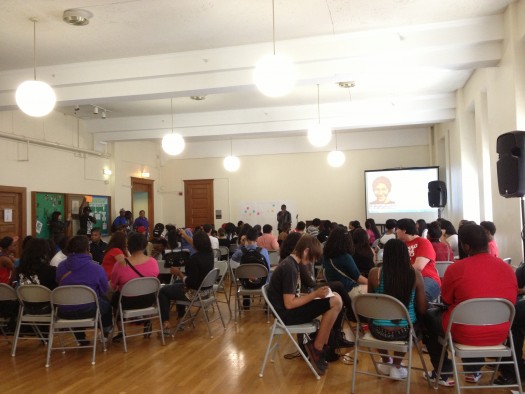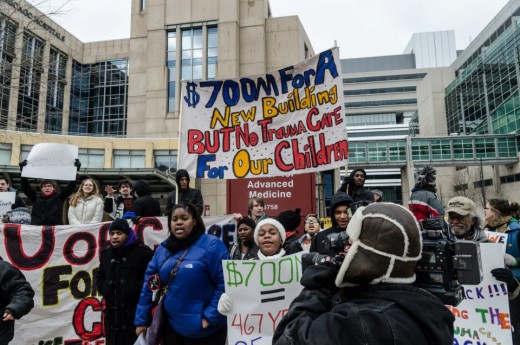Trauma, Healing, and Youth Activism in Chicago…
A lot is happening, all of the time, here in Chicago that involves young people organizing to save their own lives…
I’ve been reflecting on my own role in ethically supporting these efforts. I spent the day yesterday with over 100 (mostly) young people of color for a discussion about racism, their lived experiences, and Trayvon Martin.
The forum was not planned by young people. After the Trayvon Martin verdict, I wanted to offer a specific space where young people could gather and share their thoughts with one another. It is interesting to note that I had to turn several adults away from attending as “observers.” This is a strange pathology where grown people are unwilling to allow young people to have spaces of their own. The very idea of being an “observer” at a youth event brings to mind the concept of “native informants” used in ethnography. I bristle at this and I refused to allow adults who weren’t bringing groups of young people to attend the event. This was the right move.
I was reminded yesterday about the value of being in community with one another during trying times. The mood in the space felt almost celebratory even though the topics being discussed were harrowing and difficult. As I was packing up at the end of the event, a young woman approached me to say that she had “really enjoyed” herself. This matters because when discussions about important social issues can be had in edifying ways then they are more likely to feel relevant. The majority of the young people who attended the event are already affiliated with local organizations. Therefore I feel confident that the young people will be able to continue the conversations that were begun yesterday. It did feel as though some healing was occurring in the room just by virtue of being together.
In the same week that my comrades and I organized the Trayvon Martin youth forum, young people from the Chicago Student Union (formerly Chicago Students Organizing to Save Our Schools) were organizing an action to protest the draconian Chicago Public School budget cuts that are coming on the heels of the closing of 49 schools.
There is something healing too about taking action on behalf of an issue about which you are passionate. I have so much love and respect for the young people of the Chicago Student Union and am incredibly grateful for the adult allies who walk with them on a daily basis. I love the following words from a student who is impacted by the decisions made by the Chicago Board of Education:
I’m a CPS student. You might know me as 41311266.
I’d like to request transparency from the board. I recognize two parts of transparency.
The first involves sharing information. This would be making public access to the board less difficult, and releasing budgets in a timely fashion. This would have meant giving schools some warning before demanding they cut their budgets by $millions in 16 days.
Lincoln Park, my high school, is losing $921,000, that translates into several staff members and psychology classes some of us were looking forward to.
The second part of transparency is a bit simpler, but I imagine this board will find just as unpalatable. The second part is telling the truth, or at least not telling atrocious and obvious lies.
For example, I have heard Dr. Bennett blame the ridiculous budget cuts on the pension crisis in Springfield.
The state of Illinois has almost entirely overlooked CPS when appropriating education funding. However, should the State legislature pass pension reform, they would not save CPS’s budget. 3 years ago CPS asked Springfield for a pension holiday, requesting to pay a small fraction of what they had signed a contract to pay to the pension fund.
Because the city has not raised property taxes, and has continued to divert property taxes from schools into TIF districts, CPS again attempted to artificially surpress the CPS problem with a pension holiday. But it was turned down. You are irresponsible for relying on a pension holiday and for trying blame it on Springfield.
That example is a fairly sly lie and I did reference obvious ones. So, here’s a simpler example.After 49 schools were closed for the express purpose of closing the alleged billion dollar budget gap, CPS continued to drastically cut public education and for all our pain, you still terrorize the city whining about a billion dollar budget gap.
If this city does not have the money to keep 49 schools open, it does not have the money to build DePaul a new basketball arena, a Maggie Daley Park, or extras to Navy Pier.
Now, will you listen?
Activism is often both heartbreaking and healing. I’ve been impressed in Chicago by the persistence of young activists who have to balance this. This week, there were some wonderful developments in FLY’s Trauma Center campaign. The following update was provided by my friend Toussaint Losier who is an adult supporter of FLY:
This past Monday, members of Fearless Leading by the Youth stood with Congressman Bobby Rush outside Jackson Park Hospital as he announced his introduction of the Trauma Act.
At the bottom of this message is a partial list of news coverage.
If passed by Congress and signed by the President, this act would specifically invest $100 million in federal funds for the upgrading of local hospital facilities to provide Adult Level 1 Trauma Care.
During Monday’s press conference, Congressman Rush spoke forthrightly about his own son’s shooting death more than a decade ago and raised questions as to whether or not his son, Huey Rush, would still be alive today if he had not had to travel so far to get to an Adult Level 1 Trauma Center.
For the past three years, our Trauma Center campaign has been calling attention to the lack of adult trauma care on the South and Southeast Sides of the city. This campaign was sparked by the tragic death of Damian Turner, co-founder of Fearless Leading by the Youth (FLY), only a couple blocks away from the University of Chicago’s Pediatric Trauma Center.
An inspiring youth activist, Damian lost his life after traveling nearly a dozen miles to get to the nearest Adult Trauma Center at Northwestern hospital.
According to recently published study by Northwestern University’s Dr. Marie Crandell, who joined us at the press conference, there is a direct link between the distance it takes victims of most traumatic injuries to get a trauma center and increased morbidity.
To put it another way, each year, people die who would most likely still be alive, if there were better access to trauma care in the parts of the city where it is most needed.
While the introduction of this legislation is a clear acknowledgment of the importance of this issue, the coalition of neighbors, youth activists, college students, medical professionals, and others involved in the Trauma Center campaign realize we still have a long way to get before we have realized an effective solution to this glaring human rights violations.
Please take a moment to forward this news to others who might be concerned about this issue and encourage them to sign the petition.
Also, please take a moment to thank Congressman Rush by either calling his office:
Chicago office at (773) 224-6500
Washington office at (202) 225-4372.or, if you are a constituent, e-mailing him here:
https://rush.house.gov/
contact-me/legislative-issues For more information about the Trauma Center campaign, visit the websites of Southside Together Organizing for Power (www.stopchicago.org) and Students for Health Equity (https://www.facebook.com/she.
uchicago). As always, those of us in the Trauma Center campaign thank you for your continued support.
http://www.sacbee.com/2013/07/
22/5586997/congressman- seeking-funds-for.html http://www.nbcchicago.com/
news/local/illinois-rep-bobby- rush-chicago-trauma-centers- 216522761.html http://www.wbez.org/news/
congressman-rush-introduces- bill-fund-trauma-centers- 108145 http://abclocal.go.com/wls/
story?section=news/local&id= 9181435 http://wgntv.com/2013/07/22/
rep-rush-pushes-to-end-trauma- deserts/
There are adults across Chicago who are supporting young people’s activism and organizing with integrity. We need more such adults to step up. Look for the groups of young people in your own communities who can use some hands, some resources, and some advice (only when solicited). Then offer to step up without taking over. It’s hard to do but incredibly rewarding.


